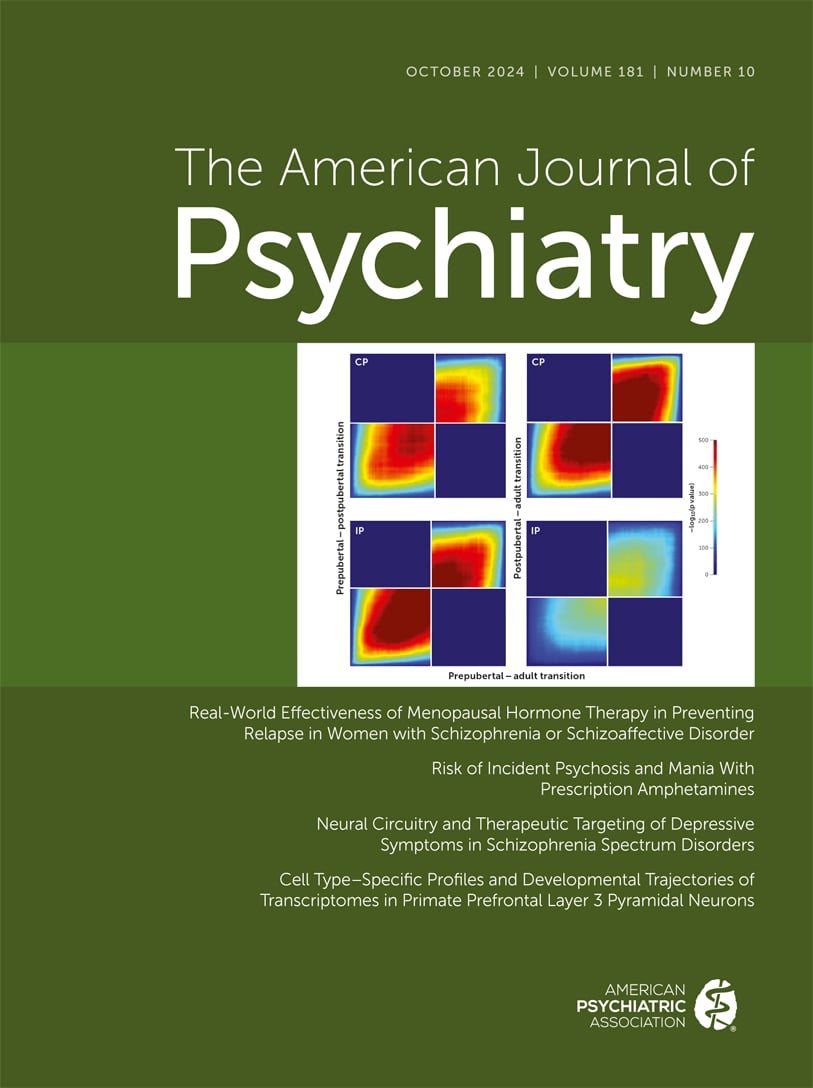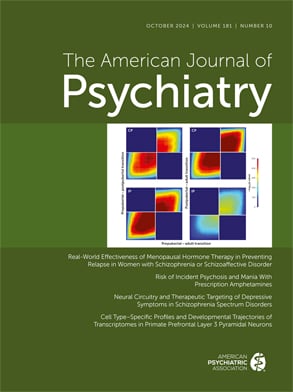The menopause transition is a physiological process marked by irregular menstrual cycles before eventual cessation of menstruation, typically occurring between the ages of 45 and 55 (
1). Female sex hormones, namely estradiol and progesterone, also show marked variation before declining to low levels. Symptoms associated with this transition can be effectively treated with menopausal hormone therapy, usually a combination of estrogen and progestogen (
2,
3).
The importance of the menopause transition in schizophrenia and related disorders is increasingly recognized. The incidence of schizophrenia diagnosed after the age of 45 is higher in women compared with men (
4,
5), a reversal of the sex ratio in younger adults. This marked age-sex interaction is also evident in those with established psychotic illnesses. Before the age of 45, men have a higher proportion of hospitalizations, but it is women who have the higher proportion thereafter (
6,
7). Women over the age of 45 also have higher rates of hospitalization compared with their younger peers and appear to derive less benefit from antipsychotic medication (
7). It is widely believed that the declining levels of sex hormones are responsible for this increased risk of psychotic deterioration or relapse in keeping with other times of hormonal transition such as in the postpartum period (
8) and the perimenstrual phase of the menstrual cycle (
9).
To date, research has largely used proxy markers of hormonal change (such as age) with little direct evidence for these hormones as a causative mechanism. Clarifying the role of sex hormones is important both for better understanding the pathophysiology of schizophrenia and as potentially modifiable risk factors. While it is possible to directly measure endogenous hormones, an alternative approach is to examine the effect of exogenous hormones on illness course. The study by Brand et al. (
10) in this issue of the
Journal, which examines the association of menopausal hormone therapy with relapse in women with schizophrenia or schizoaffective disorder, is therefore a welcome addition.
Their nationwide cohort study included women with schizophrenia spectrum diagnoses who had initiated menopausal hormone therapy between the ages of 40 and 62. The authors compared relapses within individuals during periods when they were prescribed menopausal hormone therapy and periods when this was not prescribed. Overall, the use of these medications was associated with a 16% decreased risk of psychosis relapse, driven by users who initiated this treatment before the age of 56.
These findings have broad implications. First, they further implicate declining levels of sex hormones in the increased risk of psychosis relapse around midlife. Second, they suggest that this risk can be modified through the use of menopausal hormonal therapy. These medications are already licensed and widely used for symptomatic relief of vasomotor menopausal symptoms. As an observational study, it cannot demonstrate that the hormone therapy was causal in reducing relapses, and it is plausible that in the early stages of relapse, patients would be less likely to receive regular prescriptions for physical health. However, this should be viewed in the context that one type of hormonal therapy, transdermal estradiol, already has evidence of efficacy from randomized controlled trials in schizophrenia (
11).
The largest trial of estradiol as an adjunctive treatment was conducted by Weiser et al. in 2019 (
11), using a sample of 200 premenopausal women. While the trial met its primary outcome of the PANSS positive scale, this was entirely driven by participants aged 39 or older. In younger participants, estradiol was not superior to placebo. Although this warrants further replication, it does point to age being a crucial variable when administering hormone therapy. Brand et al. mirror this finding at older ages: the therapy was not effective when initiated between the ages of 56 and 62. Taken together, this is consistent with the critical time window hypothesis (
12) for initiating hormonal therapy, which states that the beneficial effects for cognitive complaints and long-term protection against dementia rely on hormone therapy being commenced in the early stages of menopause.
Trials of estradiol in schizophrenia have been short-term and have not co-administered a progestogen. However, since schizophrenia is a chronic, relapsing disorder, the longer-term maintenance use of hormone therapy needs to be considered. This is particularly pertinent as Brand et al. suggests it may be useful in preventing relapse, not just in symptom reduction. For women with a uterus, estradiol should be given alongside a progestogen to mitigate the risk of endometrial cancer (
3). Brand et al. suggests that the beneficial effect of estradiol is not lost when combined with a progestogen.
The safety of menopausal hormone therapy has been a contentious issue. Age is an important consideration here also, with a less favorable safety profile when initiated after 60 because of increased cardiovascular risk, and this is recognized by both U.S. and U.K. guidelines supporting the safety of hormonal therapy when commenced in younger women (
2,
3). Oral estrogens carry increased risk of venous thromboembolism whereas transdermal administration, bypassing first pass liver metabolism, avoids this risk. For patients with schizophrenia with additional risk factors such as obesity, sedentary lifestyle, and smoking, the transdermal route may be preferrable. Brand et al. found this formulation to be of borderline statistical significance in the direction of being protective, likely due to a lack of statistical power. The risk of breast cancer is another pertinent issue, which, although low in absolute terms, is associated with the use of combined hormonal therapy and is also associated with prolactin-raising antipsychotics (
13).
Further randomized trials are needed before estradiol can be regarded as an effective adjunctive treatment for schizophrenia. However, evidence from both randomized trials and this large observational study indicate that these medications may be beneficial for women during the high-risk period of menopause transition. These medications are widely used and generally have an acceptable safety profile. Despite this, Brand et al. found that of the 30,785 women identified as having a schizophrenia spectrum disorder, only 3,488 (11%) received prescriptions for menopausal hormone therapy during the study time-period. This is in contrast to prescription rates of 36% in the general Finnish female population at midlife (
14). Such a discrepancy in prescription rates represents a broader trend in psychotic disorders, where higher rates of physical health conditions like cardiovascular disease are accompanied by lower rates of effective treatment.
Why do 90% of women with schizophrenia not receive a treatment with confirmed efficacy for vasomotor menopausal symptoms and emerging evidence as an adjunctive treatment for schizophrenia? This may be due to patients being less likely to seek health care and to diagnostic overshadowing, where relevant complaints are overlooked or considered secondary to a psychotic illness (
15). Improving the physical health of individuals with psychotic illnesses requires mental health care providers to take a proactive stance. As with the management of metabolic health, a lack of confidence may exist among psychiatrists in prescribing a medication that is outside their usual arsenal.
At a minimum, discussing the prescription of menopausal hormone therapy with our patients or liaise with our colleagues in primary care and gynecology, requires a cultural shift in psychiatry, where we consider the whole patient and not just the mental illness. This shift may push psychiatrists outside their comfort zone, but the resulting benefits to our patients of doing this are becoming increasingly clear.

